2016年深圳市新版初中英语八年级下Unit2 Body language单元测试题
- 格式:doc
- 大小:67.24 KB
- 文档页数:8
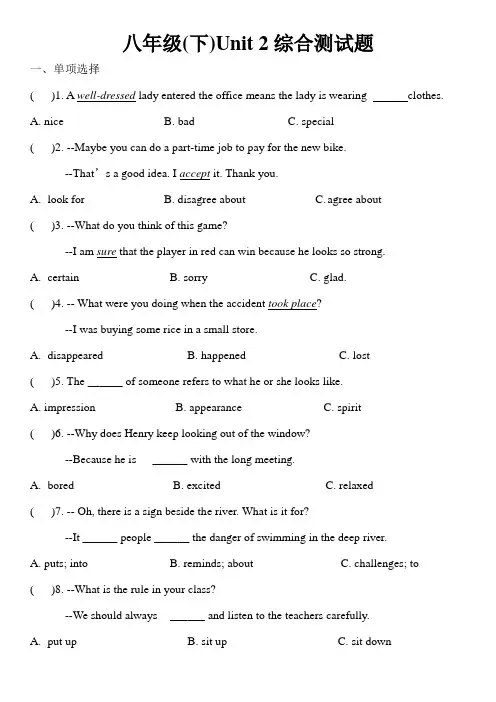
八年级(下)Unit 2综合测试题一、单项选择( )1. A well-dressed lady entered the office means the lady is wearing clothes.A. niceB. badC. special( )2. --Maybe you can do a part-time job to pay for the new bike.--That’s a good idea. I accept it. Thank you.A. look forB. disagree aboutC. agree about( )3. --What do you think of this game?--I am sure that the player in red can win because he looks so strong.A.certainB. sorryC. glad.( )4. -- What were you doing when the accident took place?--I was buying some rice in a small store.A. disappearedB. happenedC. lost( )5. The ______ of someone refers to what he or she looks like.A. impressionB. appearanceC. spirit( )6. --Why does Henry keep looking out of the window?--Because he is ______ with the long meeting.A.boredB. excitedC. relaxed( )7. -- Oh, there is a sign beside the river. What is it for?--It ______ people ______ the danger of swimming in the deep river.A. puts; intoB. reminds; aboutC. challenges; to ( )8. --What is the rule in your class?--We should always ______ and listen to the teachers carefully.A.put upB. sit upC. sit down二、语法填空I like music very much. (1) _____ I was young, I studied music at university. I (2) ____ (choose) to study in Vienna, Austria because of its musical culture. Vienna is a city (3) ____ a long history and it is also a place where many great musicians have (4) ____ (live).By (5) ________ (study) there for about one term, I was able to (6) _______ (understand) music on a high level. I took part in some of the most famous teachers’(7) ____ (class) to learn from them and the teachers all taught me (8) _______ (patient).I toured around many places of interest in Austria when I was free. There I learnt different culture and experienced different lifestyles.All in all, studying abroad is (9) ______ wonderful cultural experience for me, so I will never forget it. Now I know that my college experience is perfect. I have learnt so much about (10) ________ (I): who I am and what I should pay attention to.参考答案一、单选1-5:ACABB 6-8:ABB二、语法填空1.When2. chose3. with4. lived5. studying6. understand7. classes8. patiently9. a 10. myself。
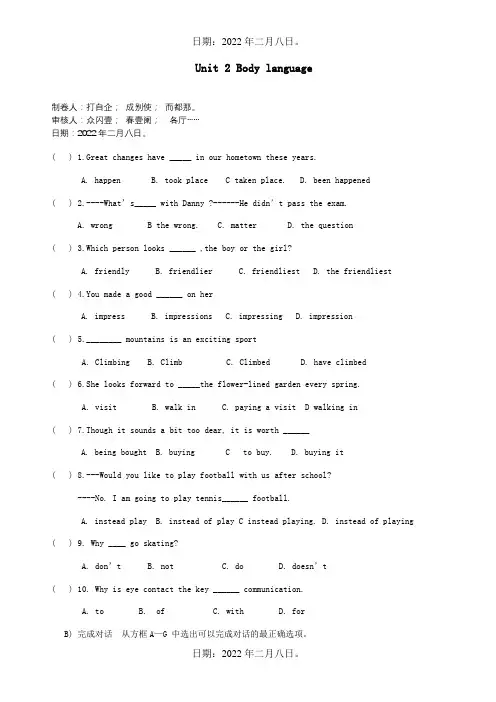
Unit 2 Body language制卷人:打自企;成别使;而都那。
审核人:众闪壹;春壹阑;各厅……日期:2022年二月八日。
( ) 1.Great changes have _____ in our hometown these years.A. happenB. took place C taken place. D. been happened( ) 2.----What’s_____ with Danny ?------He did n’t pass the exam.A. wrong B the wrong. C. matter D. the question( ) 3.Which person looks ______ ,the boy or the girl?A. friendlyB. friendlierC. friendliestD. the friendliest( ) 4.You made a good ______ on herA. impressB. impressionsC. impressingD. impression( ) 5.________ mountains is an exciting sportA. ClimbingB. ClimbC. ClimbedD. have climbed( ) 6.She looks forward to _____the flower-lined garden every spring.A. visitB. walk inC. paying a visit D walking in( ) 7.Though it sounds a bit too dear, it is worth ______A. being boughtB. buying C to buy. D. buying it( ) 8.---Would you like to play football with us after school?----No. I am going to play tennis______ football.A. instead playB. instead of play C instead playing. D. instead of playing ( ) 9. Why ____ go skating?A. don’tB. notC. doD. doesn’t( ) 10. Why is eye contact the key ______ communication.A. toB. ofC. withD. forB) 完成对话从方框A—G 中选出可以完成对话的最正确选项。
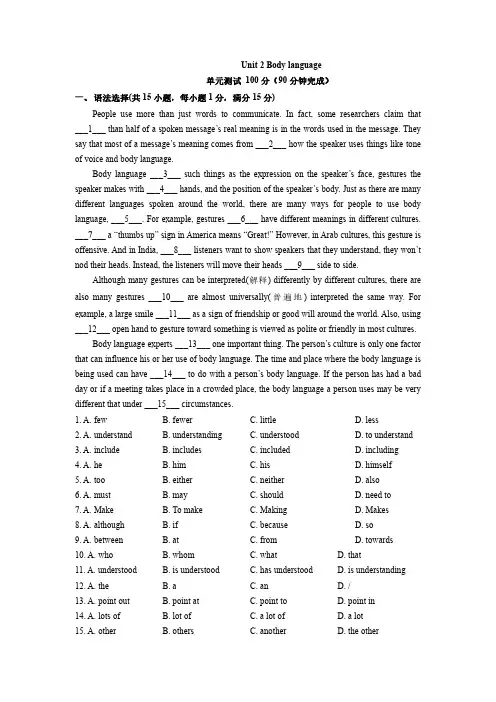
Unit2Body language单元测试100分(90分钟完成)一、语法选择(共15小题,每小题1分,满分15分)People use more than just words to communicate.In fact,some researchers claim that ___1___than half of a spoken message’s real meaning is in the words used in the message.They say that most of a message’s meaning comes from___2___how the speaker uses things like tone of voice and body language.Body language___3___such things as the expression on the speaker’s face,gestures the speaker makes with___4___hands,and the position of the speaker’s body.Just as there are many different languages spoken around the world,there are many ways for people to use body language,___5___.For example,gestures___6___have different meanings in different cultures. ___7___a“thumbs up”sign in America means“Great!”However,in Arab cultures,this gesture is offensive.And in India,___8___listeners want to show speakers that they understand,they won’t nod their heads.Instead,the listeners will move their heads___9___side to side.Although many gestures can be interpreted(解释)differently by different cultures,there are also many gestures___10___are almost universally(普遍地)interpreted the same way.For example,a large smile___11___as a sign of friendship or good will around the world.Also,using ___12___open hand to gesture toward something is viewed as polite or friendly in most cultures.Body language experts___13___one important thing.The person’s culture is only one factor that can influence his or her use of body language.The time and place where the body language is being used can have___14___to do with a person’s body language.If the person has had a bad day or if a meeting takes place in a crowded place,the body language a person uses may be very different that under___15___circumstances.1.A.few B.fewer C.little D.less2.A.understand B.understanding C.understood D.to understand3.A.include B.includes C.included D.including4.A.he B.him C.his D.himself5.A.too B.either C.neither D.also6.A.must B.may C.should D.need to7.A.Make B.To make C.Making D.Makes8.A.although B.if C.because D.so9.A.between B.at C.from D.towards10.A.who B.whom C.what D.that11.A.understood B.is understood C.has understood D.is understanding12.A.the B.a C.an D./13.A.point out B.point at C.point to D.point in14.A.lots of B.lot of C.a lot of D.a lot15.A.other B.others C.another D.the other【答案】1.D 2.B 3.B 4.C 5.A 6.B7.C8.B9.C10.D11.B12.C13. A14.D15.A【解析】本文介绍了肢体语言在不同环境和文化有不同的含义。
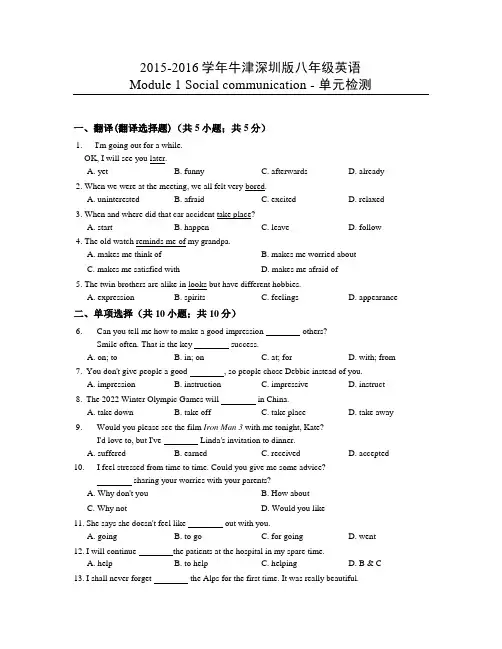
2015-2016学年牛津深圳版八年级英语Module 1 Social communication - 单元检测一、翻译(翻译选择题)(共5小题;共5分)1. --- I'm going out for a while.--- OK, I will see you later.A. yetB. funnyC. afterwardsD. already2. When we were at the meeting, we all felt very bored.A. uninterestedB. afraidC. excitedD. relaxed3. When and where did that car accident take place?A. startB. happenC. leaveD. follow4. The old watch reminds me of my grandpa.A. makes me think ofB. makes me worried aboutC. makes me satisfied withD. makes me afraid of5. The twin brothers are alike in looks but have different hobbies.A. expressionB. spiritsC. feelingsD. appearance二、单项选择(共10小题;共10分)6. --- Can you tell me how to make a good impression others?--- Smile often. That is the key success.A. on; toB. in; onC. at; forD. with; from7. You don't give people a good , so people chose Debbie instead of you.A. impressionB. instructionC. impressiveD. instruct8. The 2022 Winter Olympic Games will in China.A. take downB. take offC. take placeD. take away9. --- Would you please see the film Iron Man 3 with me tonight, Kate?--- I'd love to, but I've Linda's invitation to dinner.A. sufferedB. earnedC. receivedD. accepted10. --- I feel stressed from time to time. Could you give me some advice?--- sharing your worries with your parents?A. Why don't youB. How aboutC. Why notD. Would you like11. She says she doesn't feel like out with you.A. goingB. to goC. for goingD. went12. I will continue the patients at the hospital in my spare time.A. helpB. to helpC. helpingD. B & C13. I shall never forget the Alps for the first time. It was really beautiful.A. to seeB. seeingC. sawD. see14. The book is worth , and I'm looking forward it soon.A. to read; to readB. reading; to readC. reading; to readingD. to read; to reading15. --- I have difficulty new words. What should I do?--- You should understand the of new words before you remember them.A. remembering; meaningsB. remember; meaningsC. remembering; messagesD. remember; messages三、补全短文(共10小题;共10分)Body language is used by people for sending messages to one another. It is very helpful 16. it can help make you easily understood by others. When you are talking with others, you are not just using words, 17. also using expressions and body movements. Body language 18. (include) your facial expressions and gestures when you are communicating with other people. It is 19. important part of social etiquette (社交礼仪) and the proper use of body language can make your 20. (communicate) more effective(有效的), especially when it comes to foreign friends who can't speak your language. That means you could convey(传递) most of your information by body language even if you don't know 21. others are speaking!Different countries have different body languages. When you use a foreign language, it is important 22. (know) the meaning of gestures in the foreign country. 23. (use) body language in a correct way will help communicate with people and make the stay in a foreign country easy 24. comfortable.In a word, I think it is important 25. our lives to learn and use body language.四、完形填空(共10小题;共15分)Different things usually stand for different feelings. Red, for example, is the color of fire, heat, blood and life. It is used for signs of 26 , such as STOP signs and fire engines. Orange is the color of bright, warm and 27 in autumn. People say orange is a 28 color. They associate orange with happiness. 29 is the color of grass in spring. People say it is a refreshing color. In general, people 30 about two groups of colors: warm colors and cool colors. The warm colors are red, orange and yellow. When there are warm colors, people usually want to be 31 . The cool colors are black and blue. When there are these colors, people are usually worried. Some scientists say that time seems to 32 more slowly in a room with warm colors. They suggest that a warm color is a good 33 for a living room or a restaurant. People who are having a rest or are 34 do not want time to pass quickly. However, 35 colors are better for some offices if people working there want time to pass quickly.26. A. happiness B. support C. danger D. courage27. A. books B. leaves C. stones D. rivers28. A. lively B. dark C. noisy D. terrible29. A. Black B. Green C. Yellow D. White30. A. speak B. say C. talk D. tell31. A. surprised B. sleepy C. active D. careless32. A. go around B. go by C. go off D. go along33. A. joke B. way C. fact D. matter34. A. running B. typing C. eating D. working35. A. good B. cool C. warm D. bad五、阅读理解(共10小题;共20分)A36. If you want to be a postman, it's necessary for you to have .A. working experienceB. good knowledge of the cityC. a driver's licenseD. a college student's card37. Sunshine School needs .A. excellent English teachersB. a hard-working postmanC. full-time driversD. an outgoing tour guide38. If you want to be a taxi driver, you should .A. be over 45 years oldB. know the city very wellC. write to No. 38 Changhong Rd.D. speak English well39. The tour guides wanted should .A. have no working experienceB. be patient with childrenC. be good at drivingD. speak good English40. You can not get information by if you want to get a job above.A. making a callB. going to visit the managerC. sending an e-mailD. writing a letterBThe idea of what shaking the head means is not always the same in different countries. Maybe some visitors would be surprised when they first come to India. When they talk to an Indian, they would find he would often shake his head. The visitors might think that the Indian doesn't like what they say. But in fact, they would be completely wrong. Indians always shake their heads when they talk to others. It doesn't mean "No". If someone wants to visit India, he should know this, or he will be in trouble.One day, a foreign officer went to India on business. He hired a car and asked an Indian to drive him. When he told his driver to take him to his office, the Indian shook his head at once. The officer said again and the driver shook his head again. At last the officer, of course, got angry."How dare you refuse my order?" he shouted."Drive me to my office at once!"The driver answered in quite a loud voice, too. "Yes, sir!" But to the officer's surprise, the driver shook his head at the same time.The car started and the foreign officer was now too surprised to say a word. He thought about it for a while, and then he nodded with a smile, "'No' means 'Yes' here!"41. What does shaking one's head mean all over the world?A. It means "Yes".B. It means "No".C. It means "Glad".D. It means "Yes" or "No".42. What should you do in India if you agree with somebody?A. Shake your head.B. Nod your head.C. Speak in a loud voice.D. Say it again and again.43. Why did the officer go to India?A. He went there to visit his friend.B. He went there to buy a car.C. He went there to learn driving.D. He went there because of his job.44. Why did the officer get angry?A. Because the driver didn't understand him.B. Because the driver still shook his head after he said again.C. Because the driver didn't like the officer.D. Because the driver didn't answer in a loud voice.45. What can we learn from the story?A. When you are in India, you should always shake your head.B. You shouldn't shake your head if you're a driver.C. Shaking head will make others get angry.D. Different countries have different customs.六、单词拼写(单句首字母填空)(共5小题;共5分)46. If my uncle sends me a mobile phone, I will a it.47. People in Canada mainly speak two l —English and French.48. Jenny is b with Mike, so she doesn't want to see him.49. Some college students want to have a p job to make money.50. He doesn't know English, so he uses g to communicate with others.七、单词拼写(根据中文提示拼写单词)(共5小题;共5分)51. We can often see some (衣着人时的) ladies at the airport.52. From the (表情) on his face we know that he isn't happy.53. Some animals like giraffes have very long (颈).54. Look! Your father is (握手) hands with Mr. Brown.55. We should not judge a person by his (外貌).八、翻译(根据中文提示完成句子)(共5小题;共5分)56. 此时格林先生正在读一篇关于身势语的文章。
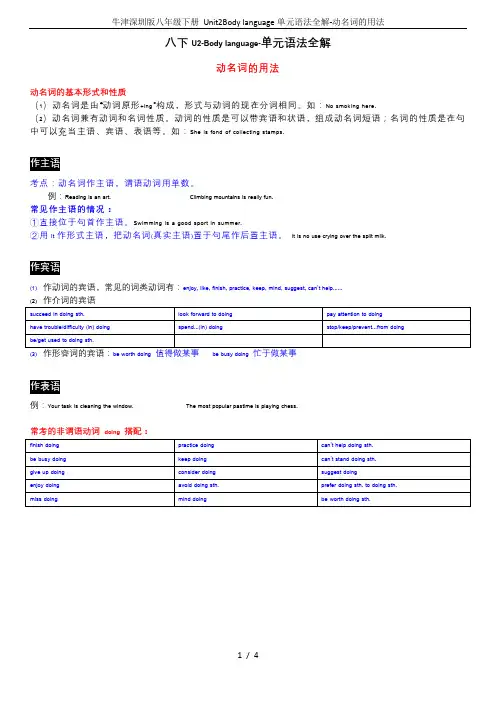
八下U2-Body language-单元语法全解动名词的用法动名词的基本形式和性质(1)动名词是由“动词原形+ing”构成,形式与动词的现在分词相同。
如:No smoking here.(2)动名词兼有动词和名词性质。
动词的性质是可以带宾语和状语,组成动名词短语;名词的性质是在句中可以充当主语、宾语、表语等。
如:She is fond of collecting stamps.考点:动名词作主语,谓语动词用单数。
例:Reading is an art. Climbing mountains is really fun.常见作主语的情况:①直接位于句首作主语。
Swimming is a good sport in summer.②用it作形式主语,把动名词(真实主语)置于句尾作后置主语。
It is no use crying over the spilt milk.(1)作动词的宾语,常见的词类动词有:enjoy, like, finish, practice, keep, mind, suggest, can’t help......作表语例:Your task is cleaning the window. The most popular pastime is playing chess.动名词专项习题一:单项选择( ) 1. --- Dear, do you mind __________? I really feel cold. --- Of course not.A. to stop to close the windowB. stopping to close the windowC. to stop closing the windowD. stopping closing the window ( ) 2. Reading stories and magazines __________Linda’s favorite hobby.A. areB. isC. wereD. being( ) 3. I’m sleepy. I prefer _________ at home to _________out to play basketball.A. sleeping; goingB. sleeping; goC. sleep; goingD. sleep; go( ) 4. _________ is bad for our health. You should stop_________.A. Smoke; smokingB. Smoking; smokingC. Smoke; to smokeD. Smoking; to smoke ( ) 5. You should avoid ___________ the same mistake again and again.A. makeB. to makeC. makingD. to making ( ) 6. --- Remember ___________ the door before ___________. --- OK, I will.A. to lock; leaveB. locking; leavingC. locking; leaveD. to lock; leaving ( ) 7. --- How about ___________ running tomorrow? --- I don’t feel like ___________.A. going; runB. go; runningC. going; runningD. go; run( ) 8. Watching movies of different countries always __________ me excited.A. makingB. makeC. makesD. will make ( ) 9. --- I suggest __________ climbing this Saturday. --- Why not __________ on Sunday?It’s sunny.A. going; goingB. go; goC. to go; goingD. going; go ( ) 10. --- Making too much eye contact is impolite. --- __________ eye contact is not polite, __________.A. Not to make; tooB. Not to making; eitherC. Not making; eitherD. Not making; too( ) 11.As my mother is looking forward to____from me,please remember____the letter on your way to company. A. hearing; posting B. hear; to post C. hearing; to post D. hear; posting ( ) 12. __________ an astronaut is difficult, but it is very exciting __________ into space.A. Becoming; travellingB. Becoming; to travelC. To become; travelD. Become; to travel ( ) 13. One learns a language by making mistakes and ______ them.A. correctsB. correctC. to correctD. correcting ( ) 14. Everyone is looking forward to ___ a good time after the exam. So they are busy preparing for the exam. A. to have B. have C. having D. to having ( ) 15. Maggie is fond of ______ pop songs from the Internet because it’s convenient.A. downloadB. to downloadC. to downloadingD. downloading ( ) 16. --Did you talk back to your mother when you were a kid?--Yes. But now I realize I was wrong. I really regret ______ that silly thing to my mom.A. doB. to doC. doingD. did( ) 17. --What kind of movies do you like better, science fiction movies or comedies? --I prefer _____ comedies. A. watches B. watching C. watched D. watch( ) 18. --Make sure you turn off the lights and the computer, Mike?--Come on, mom. You don’t need to keep ______ me of it.A. remindB. to remindC. remindedD. reminding二.语法选择When my husband and I had just moved to China, we went to dinner at a Peking Duck Restaurant. Both of us __1__ this restaurant because of its delicious food.Waiters who were friendly to us said hello __2__ a smile. Traditional pictures were put up on the wall. __3__ beautiful restaurant! I felt happy and chose a quiet corner to sit.My husband __4__ a jacket and I had a coat and we hung them on the back of our chairs when we sat down to eat. We were quite __5__ when the waitress took a cloth sack(布套) and pulled it over the backs of our chairs and __6__ the jacket and the coat completely.As we ate in more restaurants, we saw that many restaurants did this, __7__. And then we realized why they did this. Firstly, Chinese food __8__many soups, sauces, teas and so on. These might __9__ stain the clothing if the food was thrown by the waiter. Besides, many Chinese restaurants allowed people __10__, so the sack also helped keep the smell of the cigarettes __11__ from the coats and jackets.__12__ good thing is that the cloth sack can also cover a bag. When I lived in New York, I had a terrible experience of __13__ my handbag stolen when I was eating at a restaurant. __14__ handbag was right on the back of my chair. __15__I’m really happy that bag will be safely protected here in China as I enjoy the meals. ( )1. A. likes B. like C. liked D. liking( )2. A. in B. by C. with D. use( )3. A. What B. How C. How a D. What a( )4. A. put on B. wearing C. had D. dressed as( )5. A. surprisingly B. surprising C. surprised D. surprise( )6. A. cover B. covered C. covering D. was covered( )7. A. too B. either C. also D. as well as( )8. A. including B. includes C. is including D. included( )9. A. easy B. easier C. easily D. most easily( )10. A. smoking B. to smoke C. smoke D. to smoking( )11. A. up B. away C. on D. out( )12. A. Other B. The other C. Another D. Others( )13. A. have B. having C. to have D. being had( )14. A. Her B. His C. The D. Its( )15. A. But B. So C. If D. Because拓展:used to do/be, be/get used to doing 和be used to do的区别②这把刀是用来切面包的。

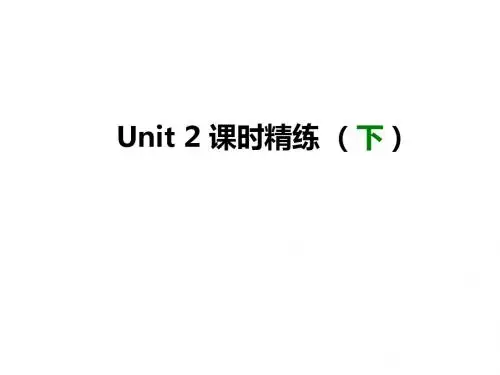
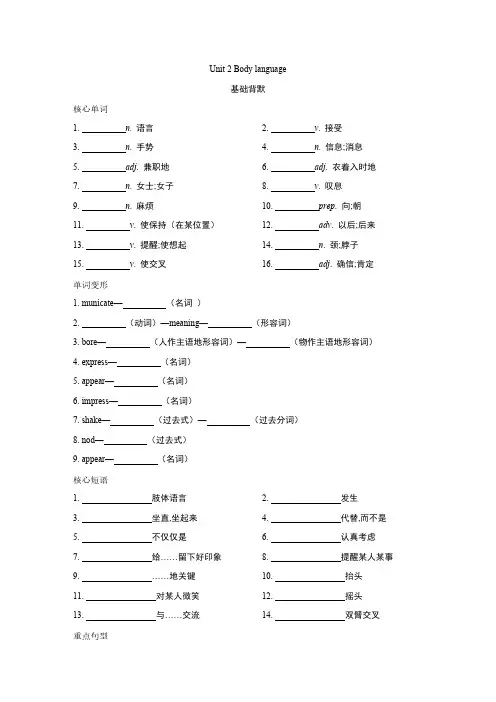
Unit 2 Body language基础背默核心单词1. n. 语言2. v. 接受3. n. 手势4. n. 信息;消息5. adj. 兼职地6. adj. 衣着入时地7. n. 女士;女子8. v. 叹息9. n. 麻烦10. prep. 向;朝11. v. 使保持(在某位置)12. adv. 以后;后来13. v. 提醒;使想起14. n. 颈;脖子15. v. 使交叉16. adj. 确信;肯定单词变形1. municate— (名词)2. (动词)—meaning— (形容词)3. bore— (人作主语地形容词)— (物作主语地形容词)4. express— (名词)5. appear— (名词)6. impress— (名词)7. shake— (过去式)— (过去分词)8. nod— (过去式)9. appear— (名词)核心短语1. 肢体语言2. 发生3. 坐直,坐起来4. 代替,而不是5. 不仅仅是6. 认真考虑7. 给……留下好印象8. 提醒某人某事9. ……地关键10. 抬头11. 对某人微笑12. 摇头13. 与……交流14. 双臂交叉重点句型1. 西蒙,妳没有给人们留下好印象。
You don't people , Simon.2. 它坐得笔直,试着对人们微笑。
He straight and at people. 3. 她想提醒我明天是她地生日。
She wanted to that tomorrow is her birthday.Unit 2 Body language基础背默核心单词1. language 2. accept 3. gesture4. message5. parttime6. welldressed7. lady 8. sigh 9. matter 10. towards11. hold 12. later 13. remind 14. neck 15. cross 16. sure单词变形1. munication 2. mean; meaningful3. bored; boring4. expression5. appearance6. impression7. shook; shaken8. nodded 9. appearance核心短语1. body language 2. take place 3. sit up4. instead of5. more than6. think over7. make a good impression on… 8. remind sb. about sth. 9. the key to… 10. hold up one's head 11. smile at sb.12. shake one's head 13. municate with…14. cross one's arms重点句型1. give; a good impression2. sat up; tried smiling3. remind me。
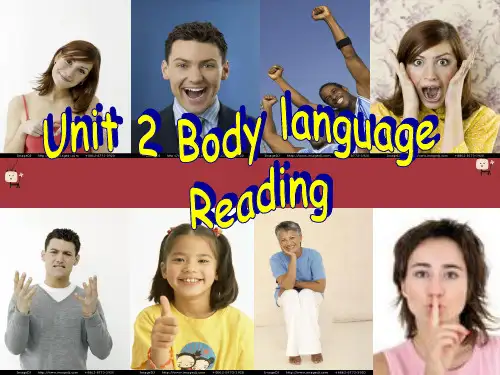
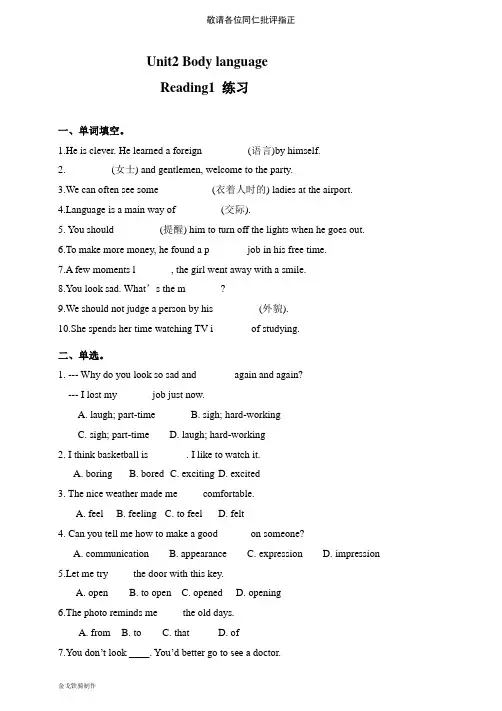
Unit2 Body languageReading1 练习一、单词填空。
1.He is clever. He learned a foreign ________ (语言)by himself.2. ________ (女士) and gentlemen, welcome to the party.3.We can often see some ________ (衣着人时的) ladies at the airport.nguage is a main way of _______(交际).5. You should _______(提醒) him to turn off the lights when he goes out.6.To make more money, he found a p_______ job in his free time.7.A few moments l_______, the girl went away with a smile.8.You look sad. What’s the m_______?9.We should not judge a person by his _______ (外貌).10.She spends her time watching TV i_______ of studying.二、单选。
1. --- Why do you look so sad and_______ again and again?--- I lost my ______ job just now.A. laugh; part-timeB. sigh; hard-workingC. sigh; part-timeD. laugh; hard-working2. I think basketball is _______. I like to watch it.A. boringB. boredC. excitingD. excited3. The nice weather made me ____ comfortable.A. feelB. feelingC. to feelD. felt4. Can you tell me how to make a good ______on someone?A. communicationB. appearanceC. expressionD. impression5.Let me try ____ the door with this key.A. openB. to openC. openedD. opening6.The photo reminds me ____ the old days.A. fromB. toC. thatD. of7.You don’t look ____. You’d better go to see a doctor.A. goodB. nicelyC. wellD. fine8.The 2022 Winter Olympic Games will ______ in China.A. take downB. take offC. take placeD. take away9. --- What’s the _________with you?---I _______in the exam.A. matter failedB. question; failedC. matter, sighedD. question; sighed10.--- What time will you arrive _______ China?--- I don't know. Maybe five hours ________.A. at; laterB. in; laterC. at, lateD. in; late三、补全句子。

1 深圳市初中英语八年级下Unit2 Body language单元测试题 笔试部分(80分) I.选择题。(每小题1分,共20分) 从下面每小题的A.B.C.D四个选项中选出可以替换划线部分的最佳选项,并在答题卡上将相应的字母编号涂黑。 ( ) 1. Her attitude towards this matter is not clear. A. in B. to C. at D. from ( ) 2. The record he holds has not been broken so far. A. suffers B. keeps C. hurts D. walks ( ) 3. That lady must be our English teacher. A. man B. teenager C. professor D. madam ( ) 4. Do you know what body language is? A. gesture language B. written language C. spoken language D. foreign language ( ) 5.When and where did it take place? A. suffer from B. come about C. come from D. match with B.选择填空。(共15小题,每小题1分)从下面每小题的A.B.C.D四个选项中选出可以填入空白处的最佳选项,并在答题卡上将相应的字母编号涂黑。 ( ) 6. Yesterday I _______an invitation from Tom but I didn't _______ it. A. received; receive B. accepted; accept C. accepted; receive D. received; accept ( ) 7. This film ________me of my late father. I miss him very much. A, promises B. reminds C. makes D. returns ( ) 8. Can you tell me how to make a good ______on someone? A. communication B. appearance C. expression D. impression ( ) 9. The word “______” means wearing attractive and fashionable clothes. A. kind-hearted B. hard-working C. home-made D. well-dressed ( ) 10. I'm ________ with the homework, Mum. A. bore B. to bore C. boring D. bored ( ) 11. --- How many_______ can you speak? --- Two English and French. A. messages B. communications C. languages D. words ( ) 12. --- Please remind me _______some English books for my son. --- OK.________. A. to buy; No way B. to buy; No problem C. buying; No way D. buying; No problem ( ) 13. --- In this example, _______ is not important. --- Yes. We shouldn't judge (判断) a person _______his or her look. A. appearance; by B. appearance; for C. expression; by D. expression; for ( ) 14. --- Since (既然) she is not in, can I leave a(n)_______ for her? --- Sure, please say ______ slowly and I will write it down. A. message; one B. message; it C. information; it D. information; one ( ) 15. --- Can you _______ the camera to take a picture for me? --- Sure. _________ my pleasure. 2
A. make; To B. hold; With C. made; To D. held; With ( ) 16. --- What time will you arrive _______ China? --- I don't know. Maybe five hours ________. A. at; later B. in; later C. at, late D. in; late ( ) 17. --- When will you _______ a vacation in Beijing? --- I'm not_______. Maybe next week. A. take; sure B. cost; sure C. take; glad D. cost; glad ( ) 18. --- Please________, Don't sleep in class. --- I'm sorry. I won't do ______again. A. sit up; it B. sit up; them C. sit in, it D. sit in, them ( ) 19. --- Why do you look so sad and_______ again and again? --- I lost my ______ job just now. A. laugh; part-time B. sigh; hard-working C. sigh; part-time D. laugh; hard-working ( ) 20. --- What's the ______ with you? --- I didn't know the______ of this sentence. A. wrong; communication B. matter; communication C. wrong; meaning D. matter; meaning II完形填空。(共10小题,每小题1分) 阅读下面短文,从短文后所给的A、B、C、D四个选项中选出能填入相应空白处的最佳选项,并在答题卡上将相应的字母编号涂黑。 M White was a famous writer. When he was visiting ___21___, he had to give a talk to a large group of students. Because most of them could not ___22___English, he had to have an interpreter (翻译).He said to the interpreter, “I'll stop many times during my talk, so you can ___23___ put it into Japanese. Please put the words into Japanese as soon as I ___24___ it." During the talk, he ___25___ a very interesting story. It was so interesting that he ___26___ to stop when he finished every two or three sentences. At last he stopped to ___27___ me interpreter translate. All the students laughed ___28___. The next day Mr White ___29___the interpreter,“Can you tell me how you made that ___30___story into such a short Japanese one?" “I didn't tell the whole story." the interpreter answered with a smile, "I just said, „Mr White told us a funny story. You will all laugh, please." ( ) 21. A. France B. America C. Japan D. China ( ) 22. A. spell B. understand C. introduce D. choose ( ) 23. A. easily B. confidently C. difficulty D. usually ( ) 24. A. develop B. mention C. finish D. enter ( ) 25. A. told B. said C. talked D. spoke ( ) 26. A. forgot B. remembered C. had D. began ( ) 27. A. order B. allow C. let